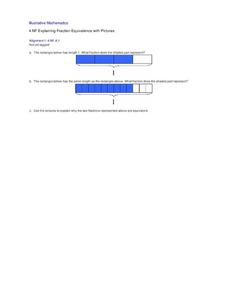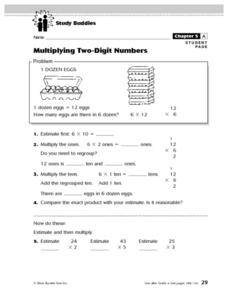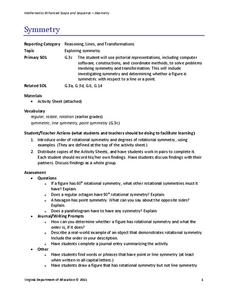Illustrative Mathematics
Explaining Fraction Equivalence with Picture
Visual models are a great tool for demonstrating the concept of equivalent fractions. Given two pictures, young mathematicians first identify each fraction and then write an explanation for why they are equivalent. Use as a guided...
Bridges In Mathematics
Kindergarten Assessments and Scoring Checklists, Common Core State Standards
Whether or not your school has adopted Common Core standards, this resource provides great tools for assessing kindergartners' key numeracy and computation skills.
Curated OER
Study Buddies: Multiplying Two-Digit Numbers
In this math homework worksheet, students will solve a 2 digit multiplication problem with parental support. Students will follow a step-by-step process and "Coach's Notes" are provided for the parent helper.
EngageNY
The Opposite of a Number
It's opposite day! The fourth installment of a 21-part module teaches scholars about opposites of integers and of zero. Number lines and real-world situations provide an entry point to this topic.
DK Publishing
Sets
Do scholars understand multiplication as sets of numbers? Help them grasp this concept through groups of objects arranged as a makeshift multiplication number sentence. They examine the sets and fill in boxes to indicate how many sets of...
Illustrative Mathematics
Rational or Irrational?
Is 4 plus the square root of 2 rational or irrational? After your class has gained a basic grasp of rational and irrational numbers, use this worksheet to push them a little further in their understanding. Learners must identify sums and...
El Paso Community College
Factoring
Factoring polynomials is an important skill through high school math and beyond. It provides instructions for the basic types of factoring and a practice set with an answer key.
Curated OER
Addition Word Problems 1, Version 1
In this addition worksheet, students solve word problems containing one and two digit numbers. Students complete 5 addition word problems.
Curated OER
More Complex Fraction Problems
If your fifth graders have mastered fractions, push them to the next level! They multiply fractions by whole numbers and decimals (in the form of money math). The worksheet provides space for pupils to write out their work, based on two...
DK Publishing
Real-life Problems, Working with Fractions
Test your fifth graders' math skills with five word problems involving fractions. After studying two examples at the top of the page, pupils multiply fractions by whole numbers to solve each word problem. The worksheet provides two...
Curated OER
Learning to Multiply
Learning how to multiply is the focus of this math resource. The first of five pages reviews the multiplication process as repeated addition. The second provides a few examples that you might consider working through with the class. An...
Illustrative Mathematics
Harvesting the Fields
This problem involving rates may look simple at first, but it is actually quite challenging. Two different sized fields are harvested by a team of workers and learners must use different rates to calculate the number of workers on the...
DK Publishing
Finding 5 - Multiplying by 5
Visualize multiplication facts using rectangular arrays. Scholars multiply single-digit factors by five and represent each number sentence using sets of dots. They circle the groups of five and fill in missing parts of the equations....
Illustrative Mathematics
Salad Dressing
Aunt Barb's salad dressing is a mixture of oil, vinegar, salt, herbs, and a pinch of math. Fifth graders add the fractional measurements of ingredients to find a total amount. The fractions have unlike denominators. After finding the...
Virginia Department of Education
Adding and Subtracting Fractions
Your learners will enjoy playing a game as a motivator to learning and remembering the adding and subtracting of fractions.
Curated OER
Interpreting Circle Graphs
What does this pie chart mean? Once scholars can analyze a circle graph on a basic level (i.e. "Most people prefer cats"), it's time to delve deeper into it. They examine two graphs here, and are given the total number of participants...
DK Publishing
Learning 10 - Write the Number
Already covered numbers 0-9? It's time to focus on 10 with this set of exercises. First, youngsters trace the number 10 three times and try printing it a couple of times on their own. Next, they count five sets of bottles and write the...
EduGAINs
Introduction to Solving Linear Systems
Word problems offer class members an opportunity to learn the concept of solving linear systems using graphs. Individuals choose a problem based upon preferences, break into groups to discuss solution methods and whether there...
Curated OER
Con-tents of the Tents
Fill in the missing numbers on this activity. Pupils display the missing consecutive numbers between the tents on the ends of each row. They also match the missing consecutive number for each group of elephants. Students solve six problems.
Curated OER
Modeling: Having Kittens
Cats can't add, but they do multiply! Determine the number of descendants of a single cat given specific facts about cats and kittens. The lesson plan focuses on developing strategies for problem solving using both individual and group...
DK Publishing
Using the 2 Times Tables, Part 2
Put on a happy face! Third graders master the two times table with the help of a worksheet that prompts them to match groups of happy faces with corresponding numbers. The catch? Each happy face represents two faces! A great way to...
Curated OER
How Many?
Working with numbers 1-10, beginning counters complete five exercises to help them hone their skills. They examine two sets of sports balls, circling the ones at various number positions. Next, they count a set of ladybugs, recording the...
Mathed Up!
Reading Scales
After watching a video on how to read different types of scales, young mathematicians complete eight problems involving scales. From thermometers to number lines to rulers and clock, class members identify various numbers on scales.
02 x 02 Worksheets
Symmetry
Get learners' minds rotating and reflecting while looking for symmetry. Pupils investigate figures to determine the number of lines of symmetry and if the figure has rotational symmetry. Classmates work together in groups to find out the...

























